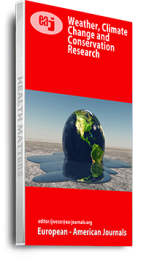Artisanal refining activities in the Niger Delta Region (NDR) of Nigeria has contributed to the destruction of aquatic biota, flora and fauna in the lithosphere and has also compromised the chemistry of the atmosphere, aggravating respiratory health and climate change among other environmentally related issues. This study was undertaken to determine the Impact of Artisanal Petroleum Refining on the Atmospheric Chemistry of Niger Delta States in Nigeria using satellite signatures retrieved from the Nasa Giovanni earth data platforms,by using the basic analytical functions of the Grid Analysis and Display System (GrADS). The state(s) observed were Bayelsa, Rivers and Imo, while Bornu was selected from the northern region of the country as a control state. Parameters investigated include; oxides of carbon-(CO, CO2), methane-(CH4), oxides of Nitrogen-(NO2), oxides of sulfur-(SO2, SO4) and organic carbons (OCs). Time average map (TAM) and time series area average (TSAA) measurement tools were deployed on satellite platform channels such as (MERRA-2, OMI, AIRS, MODIS Aqua or MODIS Terra. Results revealed that CO, SO4, CH4, NO2 and organic carbons (OCs) had atmospheric concentration levels below WHO/FMEnv limits though higher in all the Niger delta states than Bornu state. SO2 surface mass concentration was higher in Niger delta region(NDR) whereas SO2 biomass emission was higher in Bornu state. Similarly, CO2 in free troposphere was higher in the NDR between (2002 – 2005) whereas in (2007- 2012) Bornu state showed a higher atmospheric concentration probable for biomass burning rather than for artisanal refining compared to the NDR. It is recommended therefore, that data generated from this study should be used to form part of environmental data bank which can serve as a guide for future research and studies on atmospheric pollution and air quality of the region.
Keywords:

